Featured Amicus Briefs

Sectors: Business, Community, Health Care
Tranter v. Z&D Tour, Inc.
Issue: Did the lower courts improperly use a heightened standard for relief under a forum non conveniens motion?
Status: Filed
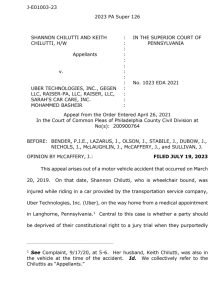
Sectors: Business, Community, Health Care
Chilutti V UBER- Decision
PCCJR Argued that the court does not have jurisdiction over an appeal from the trial court's collateral order staying the proceedings and compelling arbitration.
Status: Decided
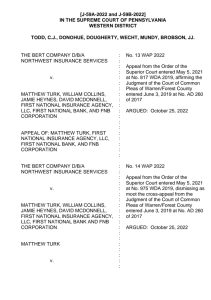
Sectors: Business, Community, Health Care
Bert V Turk – Supreme Court Decision
PCCJR Argued that punitive damages should be calculated on a per judgement basis, as opposed to per defendent, and a punitive to compensatory ratio of 9 to 1 or higher, was unconstitutional.
Status: Decided
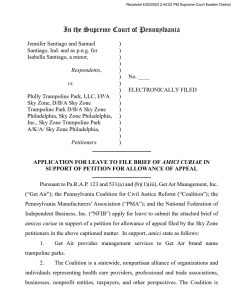
Sectors: Business, Community, Health Care
Amicus Brief in Santiago v Sky Zone
Issue: Did the Superior Court err when it held that a parent or guardian could not bind their minor child to an arbitration agreement as it violates the right to a jury trial?
Status: Filed
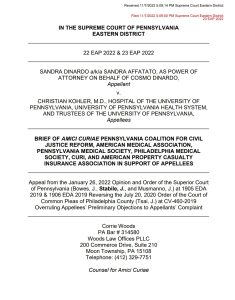
Sectors: Business, Community, Health Care
DiNardo v UPHS
The issue is:
Does the felony murder rule prevent a convicted murderer from seeking damages in the form of compensation for injuries the convict allegedly sustained as the result negligent medical treatment, when such treatment allegedly did not prevent him from committing the act of murder?
Status: filed
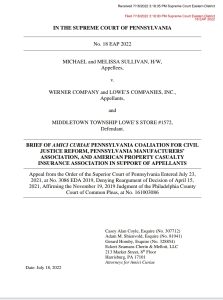
Sectors: Business, Health Care
Sullivan v Werner
This case raises the question of whether a jury should hear evidence of industry or governmental standards in design defect product liability cases. The Superior Court excluded this evidence even though the Tincher holding adopted negligence-based risk-utility analyses for design defect product liability cases.
Status: n/a
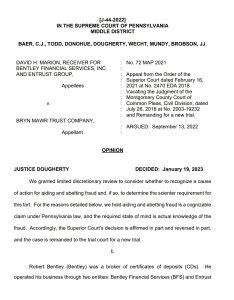
Sectors: Business, Community, Health Care
Marion V Bryn Mawr Trust
UPDATED
Issue: Should Pennsylvania recognize the tort of aiding and abetting fraud?
If the cause of action of aiding and abetting fraud is recognized, must a party have actual knowledge of the underlying fraud?
Status: filed
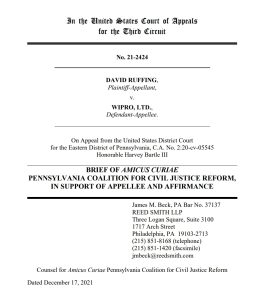
Sectors: Business, Community, Health Care
Ruffing V Wipro, LTD
This case was filed in the Third Circuit Court of Appeals. PCCJR urges the court to recognize US Supreme Court precedent and reject the concept of jurisdiction by virtue of registering to do business in Pennsylvania.
Status: n/a
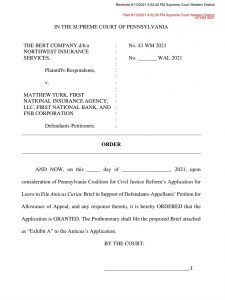
Sectors: Business, Health Care
Bert V Turk
At issue:
Unfair competition and Puntive damage ratio calculations.
Status: n/a
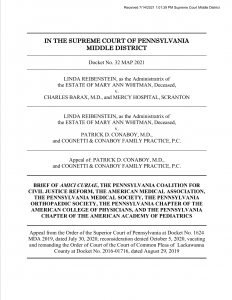
Sector: Health Care
Reibenstein vs. Conaboy
At issue:
1.Whether the Supreme Court should rule that “cause of death”, as it appears in MCARE’s statute of limitations (40 P.S. § 1303.513(d) (“Statute of Repose”)), refers to medical cause of death, and not “conduct leading to death” (or legal cause of death) as held by the Superior Court.
2. Whether the statute of limitations in a wrongful death or survival act claim may only be tolled under section 513(d) of MCARE (40 P.S. § 1303.513(d) (“Statute of Repose”)), where a plaintiff proves that the defendant against whom the claims are asserted (and not a third party) affirmatively misrepresented or fraudulently concealed decedent’s cause of death?
Status: Briefs filed


